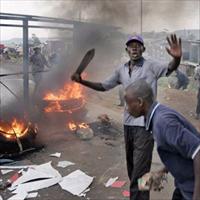KENYA: Call for lasting solution to insecurity in western region

Weary of the violence that has plagued Kenya's western district of Mount Elgon, residents have urged authorities to step up efforts to restore security in an area where long-standing disputes over land ownership erupted into bloodletting in 2006.
"The gang of attackers shot me four times after breaking down the door after they failed to burn down the house," said Stephen Chemengich, a survivor of the latest raid on 3 March, when at least 12 people, including two children, were killed.
"They also cut up my wife and beat up my three children, killing two instantly, while one child died at the hospital," said Chemengich, a resident of Embakasi village in Trans-Nzoia West district, where the attack happened. "The people responsible - women and men alike - should be arrested.
"They [the gang] did not give any reason for attacking us; it seems they were just after my life. This is because they let the cows and the calves loose but later decided to return all the livestock," he added.
Most of the raids have been blamed on the Sabaot Land Defence Forces (SLDF), a militia group ostensibly fighting for the land rights of members of the Sabaot community, a sub-group of the larger Kalenjin ethnic community.
Frequent attacks have led to the deaths of hundreds of people and the displacement of thousands more in Mt Elgon since late 2006. The SLDF was formed to protest against perceived injustices in land distribution in connection with the Chebyuk scheme in the district.
At least five victims of the latest violence, including Chemengich, have been admitted to the Kitale District Hospital, according to Gilbert Mulanda, a doctor there.
The injured include a woman with severe gunshot and machete wounds and three children who were burnt in arson attacks, Mulanda said.
Government response
In response to the latest attacks, the government has intensified security operations, but residents live in fear.
"People are scared to talk, with many of them leaving their farms for Kitale," said Ronald Matai Sakong, a local councillor in Trans-Nzoia. Kitale is about 18km from the violence-hit areas.
Sakong suggested the government should offer amnesty to militiamen believed to be hiding in the forest, to encourage them to abandon violence.
"The Sabaot council of elders and opinion leaders should be given a chance for dialogue because we all belong to the same community and we are suffering," he said.
"The only solution is forgiveness and reconciliation because relying on the police alone is not a permanent solution," he said. "Right now children and women are not staying in their homes at night, only doing so during the day when there is a police presence."
He said it was not possible to initiate dialogue between the feuding clans due to suspicion.
"If you are seen talking to a police officer you are labelled a traitor," said Sakong. "Within one community it is not possible to know who your enemy is."
The conflict has pitted the Mosop clan against the Soy clan - both are members of the Sabaot group.
"If people are affected by fighting in Mt Elgon, we are also affected in Trans-Nzoia because we are the same community," he said.
Poverty and land dependency
The councillor said it was necessary to address issues such as poverty and lack of infrastructure in the district to find a long-term solution.
"There are many people living on a narrow stretch of land, forcing others, such as the Mosop, to occupy forests," he said.
The government should build institutions where the youth could acquire skills that would enable them to have decent livelihoods and reduce their dependency on land, Sakong said. "Here, people can only rely on farming for sustenance."
According to Hezborn Wekola, an assistant relief officer with the Kenya Red Cross Society in the western region, it was vital to create job opportunities for the youth to reduce their involvement in militia activities.
"In the short term, the youth should also be provided with recreation facilities and livelihood support, such as farming implements, so that they are gainfully occupied to avoid engaging in destructive activities," Wekola said.
Meanwhile, the KRCS and other humanitarian agencies continued distributing food and non-food items to thousands of displaced people in the area. At least 2,200 people are camped at Gituamba, near Embakasi village, the scene of the violence, according to an earlier assessment.
Those targeted in the attacks were mainly people who were unwilling to support the militias, according to local sources.
 Back and Next - Back and Next
Back and Next - Back and Next See Also - See Also
See Also - See Also